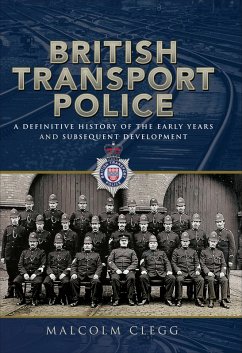This book traces the history of the British Transport Police, the National Police Force responsible for policing the railways of England, Scotland and Wales. The roots of the Force go back almost 200 years, starting with the development of the railways during the Nineteenth Century. Hundreds of railway companies were founded and although mergers and amalgamations took place, by the end of the century, well over 100 railway companies were operating, most of which employed railway policemen. The first railway policemen were recruited to work on the Stockton and Darlington Railway in 1826. Other railway companies quickly followed and by the 1850s, railway policemen with their smart uniforms and top hats were a common sight on Britain's railways. During the Twentieth Century, railway companies continued to merge before being nationalized in 1948. The following year, the British Transport Commission (BTC) was created to oversee not only the newly nationalized railway network, but also the nation's docks, shipping, inland waterways, road transport, road haulage and other companies. Also in 1949, the British Transport Commission Police (BTC Police) was created to take over the policing of these newly nationalized institutions. All the former railway, dock and canal police forces were then absorbed into the new BTC Police Force. The BTC was abolished in 1962, having incurred serious financial losses. The BTC Police was renamed the British Transport Police in 1963 and has continued to operate ever since. It no longer polices the docks, harbors and canals for reasons outlined in this book.
Bitte wählen Sie Ihr Anliegen aus.
Rechnungen
Retourenschein anfordern
Bestellstatus
Storno









